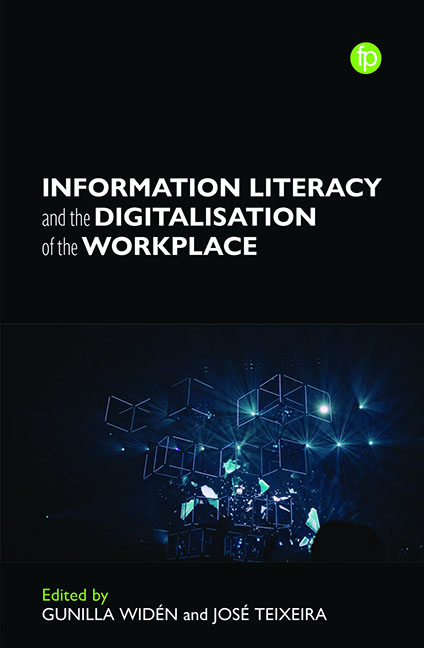Book contents
- Frontmatter
- Contents
- Figures and Tables
- Contributors
- Introduction: Advancing Theory on Workplace Information Literacy
- 1 Literature Review: In Search of the Many Meanings of Information Literacy
- 2 Digital Literacy in a Post-Digital Era: Rethinking ‘Literacy’ as Sociomaterial Practice
- 3 Methodological Choices of Information Literacy in the Workplace: Qualitative, Quantitative or Mixed-Methods?
- 4 Investigating Information Seeking and Information Sharing Using Digital Trace Data
- 5 Making Do With Limited Transparency of Sensitive Information in Secretive Organisations: Collective Information Literacy Through Hinting
- 6 Information Literacy Competencies for Career Transitions in the Digital Age
- 7 The Importance of Information Literacy for Work Satisfaction in a World-Wide-Workplace Context
- 8 Entrepreneurs’ Digital Information Sources Selection: A Perspective on the Impact of Information Literacy and Generational Differences
- 9 Conclusion: Workplace Information Literacy as the Literacy of the Digital Workplace
- Index
4 - Investigating Information Seeking and Information Sharing Using Digital Trace Data
Published online by Cambridge University Press: 17 December 2023
- Frontmatter
- Contents
- Figures and Tables
- Contributors
- Introduction: Advancing Theory on Workplace Information Literacy
- 1 Literature Review: In Search of the Many Meanings of Information Literacy
- 2 Digital Literacy in a Post-Digital Era: Rethinking ‘Literacy’ as Sociomaterial Practice
- 3 Methodological Choices of Information Literacy in the Workplace: Qualitative, Quantitative or Mixed-Methods?
- 4 Investigating Information Seeking and Information Sharing Using Digital Trace Data
- 5 Making Do With Limited Transparency of Sensitive Information in Secretive Organisations: Collective Information Literacy Through Hinting
- 6 Information Literacy Competencies for Career Transitions in the Digital Age
- 7 The Importance of Information Literacy for Work Satisfaction in a World-Wide-Workplace Context
- 8 Entrepreneurs’ Digital Information Sources Selection: A Perspective on the Impact of Information Literacy and Generational Differences
- 9 Conclusion: Workplace Information Literacy as the Literacy of the Digital Workplace
- Index
Summary
Introduction
We live in an ‘information age’ and an ‘information economy’ (see Sampler, 1998; Boisot, 1998). As argued before by Shapiro and Varian (1999), ‘information rules’ in the age of the internet. Information is available so quickly, ubiquitously and inexpensively that markets, organisations and individuals are now facing the problem of information overload (Shapiro and Varian, 1999). While ‘information’ is a very broad term, information theorists pointed out that information is better understood by conceptually dissecting it as an interaction between information seeking and information sharing (Robson and Robinson, 2015). Either by taking a perspective of information as a medium (for example, storage) or information as a process (for example, communication) the concepts of information seeking and information sharing come into play (Robson and Robinson, 2015).
Much of this information ‘revolution’ has been driven by advancements in technology. Particularly, the adoption of computers and the internet have shaped to a large extent how we seek and share information (Boisot, 1998; Shapiro and Varian, 1999). Information seeking and sharing moved away from paper and happens now online using computers in a transformation process known as digitalisation (Nikou, Brännback and Widén, n.d.; Meyer, Schaupp and Seibt, 2019; Olson and Pollard, 2004). With digitalisation also came a growing availability of digital data in a phenomenon known as ‘big data’.
Evidencing the academic relevance of digitalisation and big data, many journals across disciplines issued special issues on the concepts (for example, Journal of Communication and Social Science Computer Review among others). Furthermore, some renowned academic publishers have also launched new journals devoted to the topic, such as Big Data & Society (SAGE), Big Data Research (Elsevier) and Journal of Big Data (Springer). Digitalisation is now mentioned in the ‘official aims and scope information’ of journals across many disciplines, including sociology, marketing, organisation studies, innovation studies, information science and software engineering. This all points to the need for multidisciplinary research efforts to fix problems that emerge with the digitalisation of information.
Literature review
Digital trace data
Before defining the concept of ‘digital trace data’, it is good to revisit the three characteristics of all trace data as proposed by Howison, Wiggins and Crowston (2011).
- Type
- Chapter
- Information
- Publisher: FacetPrint publication year: 2023



